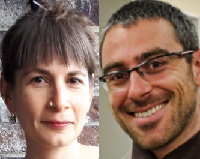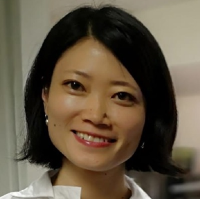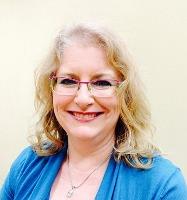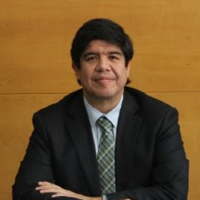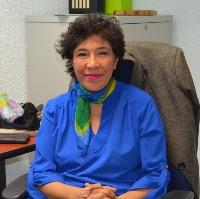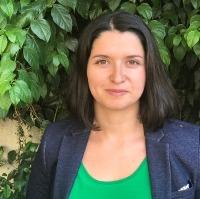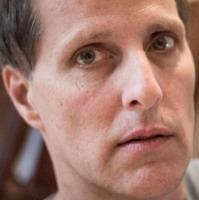Blog
Unless otherwise stated, content is shared under CC-BY-NC Licence
Charting the Landscape: A digital content review for effective long-term preservation planning
Daniele Balduzzi is IT Officer/Archivist and Shiri Alon is Archivist at World Bank Group Archives
A year ago, our colleagues Jeanne Kramer-Smyth and April Miller published a post about the people and process investments required for the Archives of the World Bank Group (WBG) to fully handle both analog and born-digital records. In this post we will discuss how we are defining the digital landscape of the WBG in order to shape and refine our long-term digital preservation strategy.
Planning for long-term preservation of digital content is a challenging task, often resulting in more unanswered questions than definitive decisions. It’s a complex effort, but also an iterative process with a staggered implementation: setting a course for a distant future in a dynamic present requires a solid sturdy boat, a clear map to refer to, and the agility to navigate in uncharted waters.
The Pre-Digital Preservation Black Hole
Eng Sengsavang is Reference Archivist for United Nations Educational, Scientific and Cultural Organization (UNESCO) in Paris, France
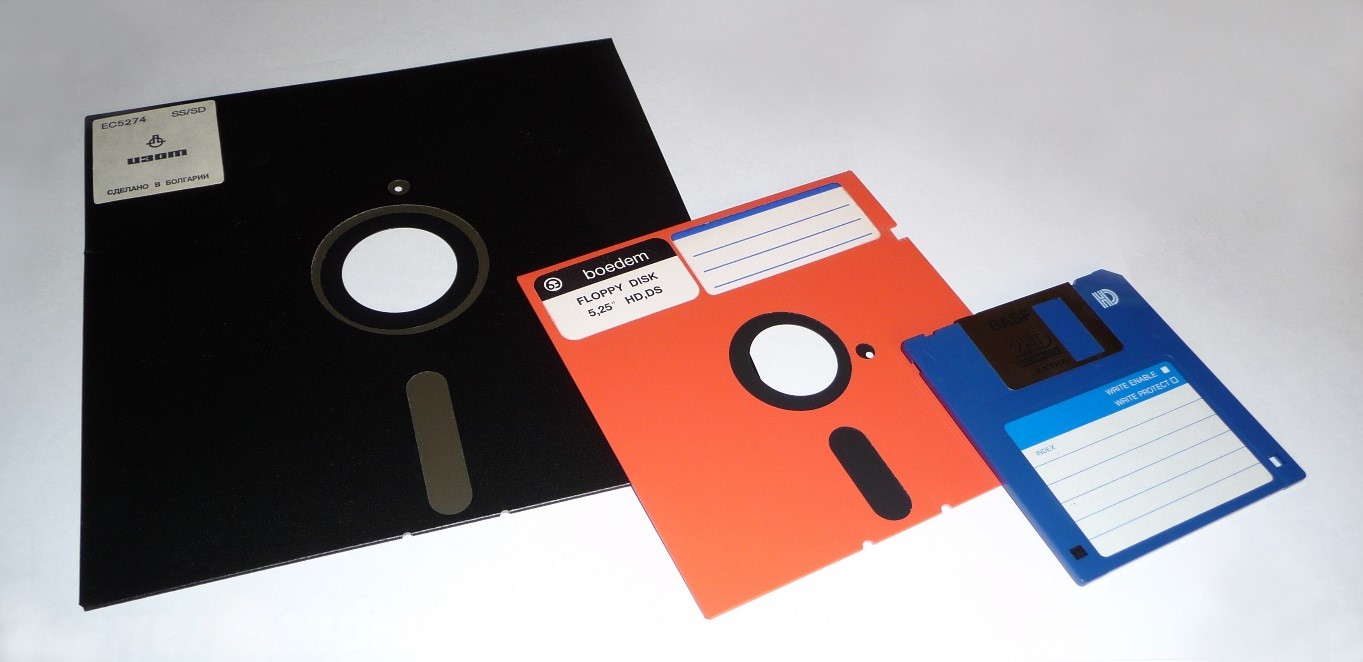
Credit: George Chernilevsky: https://commons.wikimedia.org/wiki/File:Floppy_disk_2009_G1.jpg#/media/File:Floppy_disk_2009_G1.jpg
My experience of technology is inevitably historical: as a child of the 80s, an adolescent of the 90s, and an adult into the 2000s, I experienced first-hand the paradigm shift from analogue to digital technologies, alongside the continual accrual of different eras of technology co-existing simultaneously. Of course, not only mine, but every person’s experience of technology is necessarily historical: throughout our lives, we experience on a deeply personal and at the same time macro level the mutations of technologies that seem to gather speed over time, new technologies continually appearing and old ones disappearing or threatening to disappear, and being replaced or persisting in ways both predictable and unexpected.
On a Transparent Process for Digital Preservation
Leslie Johnston is Director of Digital Preservation at the U.S. National Archives and Records Administration (NARA) in Washington DC, USA
The Strategic Plan for the U.S. National Archives and Records Administration outlines a vision to ensure ongoing access to government information. Digital preservation is crucial for this work, as evidenced by the June 2019 direction (M-19-21, Transition to Electronic Records) to Federal agencies to transition to a fully electronic government and to end the National Archives’ acceptance of analog records after December 31, 2022.
The Strategic Plan also embraces an Open NARA, one that is both transparent about its operations and participates in an open community where it can learn from the insights of other organizations. As part of achieving that goal, NARA has released its Digital Preservation Framework for public comment. The release of this framework will allow NARA staff, federal agencies, the public, and our colleagues in the archival and preservation communities to weigh in and assist us in creating the standard for digital preservation in the U.S. Federal government. We want to ensure that both our process for identifying and mitigating risk in the electronic records that we preserve and make accessible and the decisions that we have made are as transparent as possible.
Teaching a Young Dog Old Tricks: Emulation Research at the National Library of Scotland
Sara Day Thomson is Research Officer at the DPC | Graham Purnell is Digital Preservation Assistant at the National Library of Scotland
1: Getting Our Feet Wet in Emulation
World Digital Preservation Day celebrates all the inspiring work being done in digital preservation around the world. It celebrates innovative tools and techniques, effective advocacy and awareness-raising, and collaboration among fellow practitioners. This summer, I got to experience all of those things at the National Library of Scotland (NLS) as part of a digital preservation skills upgrade.
It all started when Lee and Graham - the digital preservation team at NLS - agreed to let me help them with some speculative research into emulation for digital preservation and access. I learned a lot about emulation as a technology but also about the real-life, facepalming frustrations of trying to coax 20-odd year old software to work properly on a legacy OS built in VirtualBox.
While the research was limited to a few test cases just to get our feet wet, I came away with a much deeper understanding of the opportunities and limitations introduced by emulation as a digital preservation strategy for heritage institutions. With patience and good humour, Graham taught this young dog some old tricks.
But before I get to the juicy bits, I thought I’d paint the scene a little with a few basics about emulation for those readers who, like I did, need a refresher.
If you’re all up to date on emulation as a digital preservation strategy, feel free to skip to section 3: It works! Wait, is it working?.
Estamos perdiendo la credibilidad
Hernán Cabrera Pichuante es Jefe de Proyectos Técnicos del Proyecto de Modernización de Archivos Nacionales de Chile (National Archives of Chile)
[English version follows]
Estamos llenos de información almacenada y muchos de mis conocidos en el área de TI insisten en que la copia no solo es segura, sino que, prácticamente eterna.
Es frecuente ver como las políticas de respaldo de los activos tecnológicos llenan bodegas con cintas magnéticas creadas en modernos sistemas automáticos de respaldo.
Es frecuente ver como una y otra vez, al querer recuperar algo la respuesta es: ¿te acuerdas de más o menos de que fecha es lo que me pides?
Es más frecuente aún, que luego de un par de días de búsqueda, la cinta se encuentre y lo que sigue es que estas, por lo general, contienen más de una versión del mismo documento y nos preguntamos …y ¿cuál de todos estos documentos es el que busco?
La Red Iberoamericana de Preservación Digital de Archivos Sonoros y Audiovisuales (RIPDASA) frente al riesgo de pérdida de los archivos sonoros y audiovisuales
Perla Olivia Rodríguez Reséndiz es Coordinadora de Red Iberoamericana de Preservación Digital de Archivos Sonoros y Audiovisuales (RIPDASA) e investigadora de la Universidad Nacional Autónoma de México (UNAM).
[English version follows]

En el Día Mundial de la Preservación Digital es necesario recordar que subiste el riesgo de pérdida, tanto de las grabaciones sonoras y audiovisuales registradas en soportes analógicos como de las que fueron creadas de origen digital. Este es un peligro latente y un problema social contemporáneo que afecta a todos los archivos. No obstante, son especialmente sensibles a esta pérdida los países que hasta ahora no han puesto en marcha políticas y estrategias de preservación digital sustentable.
Preservación digital: la comunidad profesional como base para su desarrollo
Gabriela Andaur Gómez es Profesora Asistente, Facultad de Economía y Negocios, Universidad Alberto Hurtado, Consejera, Comité Memoria del Mundo – Chile (UNESCO) y Archivera, Proyecto de Modernización, Archivo Nacional de Chile
[English version follows]
Desde hace algunos años hemos visto como dentro de la comunidad profesional latinoamericana ha comenzado a instalarse la preocupación sobre la preservación digital. Este discurso ha comenzado a permear, aunque lentamente, en las instituciones archivísticas locales y las comunidades vinculadas al patrimonio documental. No obstante, falta mucho para generar conciencia sobre la fragilidad de los documentos en el entorno digital, de tal manera de pasar desde la comprensión del problema al avance en su solución.
Uno de los mayores problemas que enfrentamos es la parálisis. Estamos aprendiendo que la preservación digital es una tarea gigantesca y sin fin, que requiere recursos constantes (y superiores a los que solemos tener), la aplicación de estándares técnicos diversos a los que no siempre tenemos acceso, además de competencias distintas a las que hemos estado adquiriendo en nuestros programas de formación archivística. ¿Cómo preservaremos nuestros documentos electrónicos si no tenemos claro cómo ni dónde empezar? ¿dónde obtendremos los recursos necesarios? ¿cómo nos capacitaremos? La problemática es tan compleja que el miedo y la parálisis son las primeras reacciones, y acabamos por no hacer nada al respecto.
If you can’t start big, start small
Millard Schisler is Adjunct Faculty for the Online Master’s in Museum Studies at Johns Hopkins University. He lives and works with Digital Preservation in Brazil
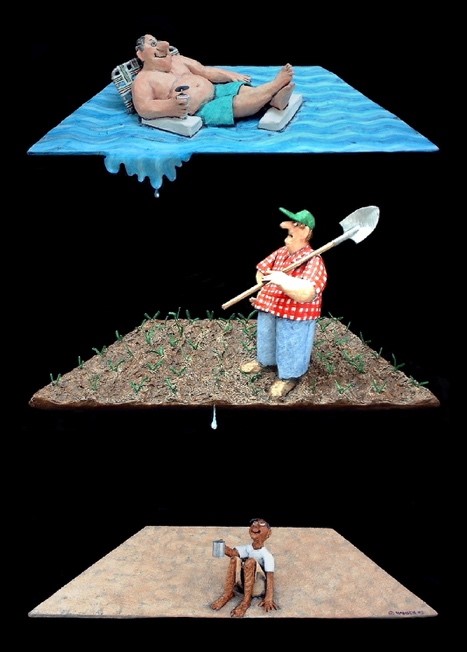
I have always liked the image of the three-dimensional sculpture figures created by artist Stephen Hansen as a way to illustrate the “trickle-down economics” of the Reagan era – it is pretty much self-explanatory as to the “distribution” of wealth. This image also comes to my mind when I think of the international and national organizations that brand the need for digital preservation in their meetings and conferences and create manifestos and guidelines to steer us all. I am grateful for this work, and am not against these efforts and strategies, but many times these ideas seem to take a long time to trickle down to the bottom where everyday life is, much like this image.
The crucial work of digitizing and publicizing Museum's collections as a way of preservation and spreading knowledge: the case of Museu Nacional/UFRJ
Cristiana Serejo is Deputy Director at Museu Nacional/ Universidade Federal do Rio de Janeiro
Due to the great fire, which occurred in September 2018, the collection of the permanent exhibition, as well as part of the scientific collections, were lost. Despite the invaluable loss of historical objects and specimens, the institution has been invested in projects of preservation and digital recovery of its collections as a strategic action to safeguard and preserve collection data for future generations.
Founded in 1818, the National Museum (MNRJ) is the oldest scientific institution in Latin America. For more than two centuries the museum has been and is still a fundamental agent for the cultural and scientific development of the country. Nowadays, in addition to promoting scientific education and dissemination, the institution develops world-renowned research lines in the areas of anthropology, botany, zoology, geology and paleontology.
Extracting Information from 5.25” Floppy Disks – Historic Environment Scotland
Frederick Alexander is Digital Archivist at Historic Environment Scotland
The digital archive at Historic Environment Scotland comprises of 42 terabytes of digital materials. This archive, alongside its physical counterpart, contains information relating to the historic environment of Scotland. Scotland’s historic environment is the physical evidence of past human activity, from a prehistoric fort, to a Victorian garden, to a drawing of a cityscape. In this blog post I want to give an example of how we extracted and preserve at-risk digital materials, and in doing so developed our digital preservation skills.
In 2018 we received a deposit of operational records from Reiach and Hall Architects. Reiach and Hall was established in 1965 and has been responsible for the redevelopment of Dundee Council Civic Offices (Dundee), the University of St Andrews Medical Sciences Building (St Andrews), and the Scottish National Blood Transfusion (Edinburgh).This collection comprised of drawings, reports, and project files. There was an additional digital deposit, including seventeen 5.25 floppy disks.

















































































































































